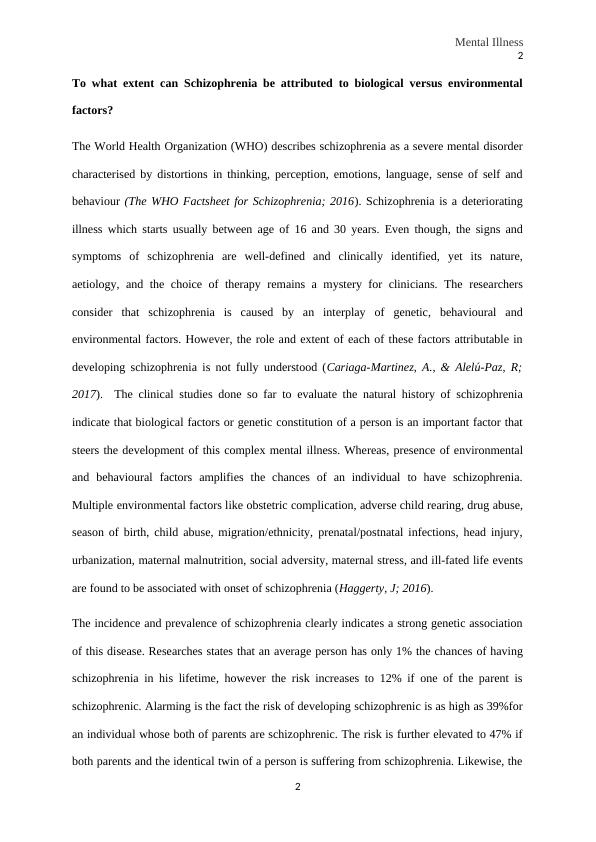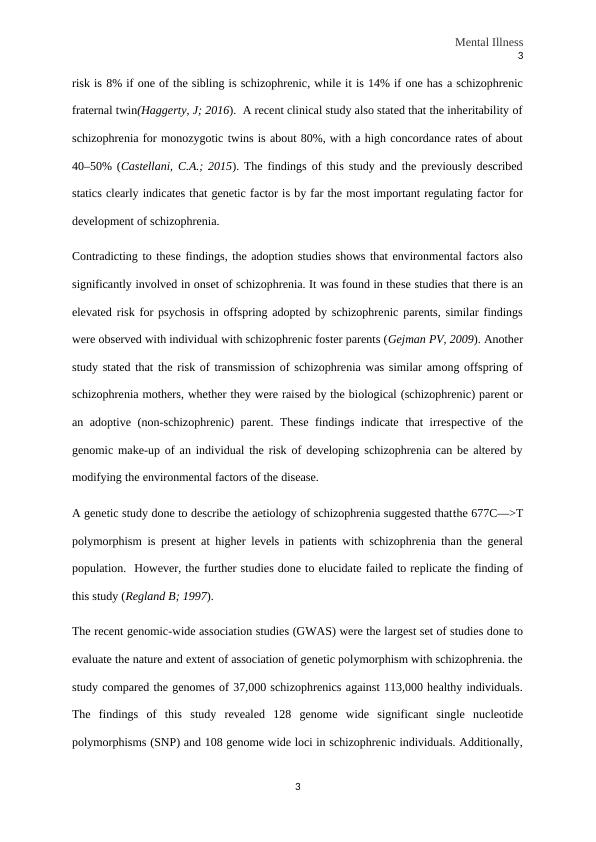Ask a question from expert
Mental Illness and Bioinformatics Assignment
8 Pages1856 Words289 Views
Added on 2019-12-04
Mental Illness and Bioinformatics Assignment
Added on 2019-12-04
BookmarkShareRelated Documents
Mental Illness1Mental Illness Student's Name: Instructor's Name:Date:1

Mental Illness2To what extent can Schizophrenia be attributed to biological versus environmentalfactors?The World Health Organization (WHO) describes schizophrenia as a severe mental disordercharacterised by distortions in thinking, perception, emotions, language, sense of self andbehaviour (The WHO Factsheet for Schizophrenia; 2016). Schizophrenia is a deterioratingillness which starts usually between age of 16 and 30 years. Even though, the signs andsymptoms of schizophrenia are well-defined and clinically identified, yet its nature,aetiology, and the choice of therapy remains a mystery for clinicians. The researchersconsider that schizophrenia is caused by an interplay of genetic, behavioural andenvironmental factors. However, the role and extent of each of these factors attributable indeveloping schizophrenia is not fully understood (Cariaga-Martinez, A., & Alelú-Paz, R;2017). The clinical studies done so far to evaluate the natural history of schizophreniaindicate that biological factors or genetic constitution of a person is an important factor thatsteers the development of this complex mental illness. Whereas, presence of environmentaland behavioural factors amplifies the chances of an individual to have schizophrenia.Multiple environmental factors like obstetric complication, adverse child rearing, drug abuse,season of birth, child abuse, migration/ethnicity, prenatal/postnatal infections, head injury,urbanization, maternal malnutrition, social adversity, maternal stress, and ill-fated life eventsare found to be associated with onset of schizophrenia (Haggerty, J; 2016).The incidence and prevalence of schizophrenia clearly indicates a strong genetic associationof this disease. Researches states that an average person has only 1% the chances of havingschizophrenia in his lifetime, however the risk increases to 12% if one of the parent isschizophrenic. Alarming is the fact the risk of developing schizophrenic is as high as 39%foran individual whose both of parents are schizophrenic. The risk is further elevated to 47% ifboth parents and the identical twin of a person is suffering from schizophrenia. Likewise, the2

Mental Illness3risk is 8% if one of the sibling is schizophrenic, while it is 14% if one has a schizophrenicfraternal twin(Haggerty, J; 2016). A recent clinical study also stated that the inheritability ofschizophrenia for monozygotic twins is about 80%, with a high concordance rates of about40–50% (Castellani, C.A.; 2015). The findings of this study and the previously describedstatics clearly indicates that genetic factor is by far the most important regulating factor fordevelopment of schizophrenia. Contradicting to these findings, the adoption studies shows that environmental factors alsosignificantly involved in onset of schizophrenia. It was found in these studies that there is anelevated risk for psychosis in offspring adopted by schizophrenic parents, similar findingswere observed with individual with schizophrenic foster parents (Gejman PV, 2009). Anotherstudy stated that the risk of transmission of schizophrenia was similar among offspring ofschizophrenia mothers, whether they were raised by the biological (schizophrenic) parent oran adoptive (non-schizophrenic) parent. These findings indicate that irrespective of thegenomic make-up of an individual the risk of developing schizophrenia can be altered bymodifying the environmental factors of the disease. A genetic study done to describe the aetiology of schizophrenia suggested thatthe 677C—>Tpolymorphism is present at higher levels in patients with schizophrenia than the generalpopulation. However, the further studies done to elucidate failed to replicate the finding ofthis study (Regland B; 1997).The recent genomic-wide association studies (GWAS) were the largest set of studies done toevaluate the nature and extent of association of genetic polymorphism with schizophrenia. thestudy compared the genomes of 37,000 schizophrenics against 113,000 healthy individuals.The findings of this study revealed 128 genome wide significant single nucleotidepolymorphisms (SNP) and 108 genome wide loci in schizophrenic individuals. Additionally,3

End of preview
Want to access all the pages? Upload your documents or become a member.
Related Documents
Biological Factors and Mental Illnesslg...
|7
|1888
|144
Mental Health and Schizophrenia in Criminal Justicelg...
|7
|1490
|358
Schizophrenia: An Overviewlg...
|14
|3544
|101
Epidemiological Research Article Critical Analysislg...
|11
|3009
|50
Project Proposal on Creative Arts for Creative Mindslg...
|18
|4829
|36
PARENT PSYCHOPATHOLOGY - Essaylg...
|12
|3112
|17